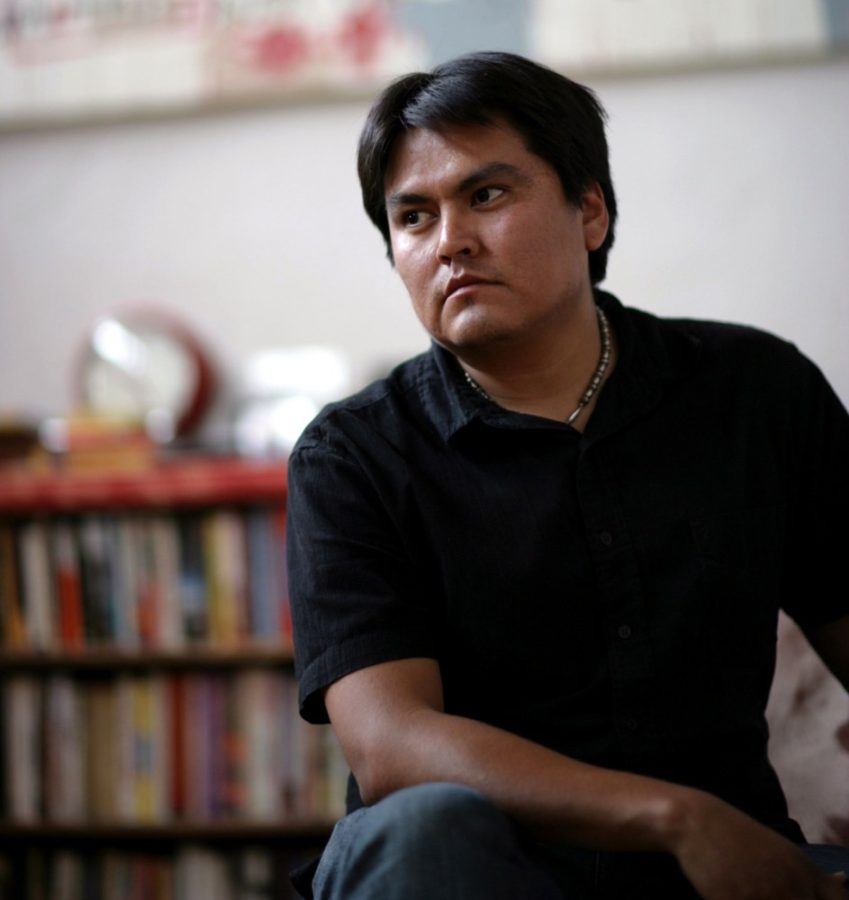Sherwin Bitsui, a Navajo poet, will be reading his work at the UA Poetry Center on Thursday as part of the Poetics and Politics of Water series put on by the American Indian Studies Program and the department of English. Originally from White Cone, Ariz., Bitsui lived in Tucson for around a decade before moving to San Diego, where he teaches for the MFA creative writing program at San Diego State University. Bitsui is also a faculty instructor for the MFA creative writing program at the Institute of American Indian Arts in Santa Fe, N.M. The Daily Wildcat caught up with the author to talk before his upcoming reading.
Daily Wildcat: How did you start writing?
Bitsui: I started writing, at least more seriously as a poet, when I was probably at the Institute of American Indian Arts in Sante Fe, [N.M.] … I took a creative writing class at a community college in [Holbrook, Ariz.], and I just started from there. Nothing too miraculous or interesting. No explosions.
Your poetry deals a lot with reintroducing ideas/concepts through Navajo culture. How do you deal with explaining cultural concepts?
It’s hard to contextualize simply. There are so many great writers out there — Navajo poets. I think that they can get a sense of deeper understanding of [Navajo’s] experience.
How do you deal with that sense of disconnection where you can’t explain things thoroughly?
Do you mean like ceremonial stuff? I guess I just don’t approach those sorts of stuff. I don’t really need to. … What I’m doing sort of occurs in a temporary space. I feel like I don’t really have to perform my culture in a way that would be inauthentic to me. I don’t think I’m pressured in that way. I’m very clearly able to move about between my spaces — that’s just cause I go home, I come from that experience. I come from the [reservation]. I feel rooted in that space. I feel I can be who I am and what I am and bring it to a performance space — or moment where my work is speaking — on many levels, not just … the singular experience, but that it’s coming from a contemporary space. I’m most interested in how those perspectives resonate and how it can be a moment of sharing.
How has the Navajo culture influenced your writing?
I think that I have been influenced by how I was raised and how I was to be in the world. It’s not an “otherness”- — it’s not a sense of my culture being over there and this being over here. I am constantly in my culture. But ultimately, the work itself raises certain questions, so that would probably the artist side of me -— someone who is affected by directions of contemporary global society -— so I can’t help but be involved in that [society]. Definitely the language influences my work and just the way of understanding that I was raised with. The way of being and how we approach our world, the land, each other- — how we approach hak’éí, [or relatives by blood], and how we reflect that however oppositional we are to contemporary society.
What are some challenges you faced as you write?
I think that different challenges in different parts of my life arise. I think maybe when I was younger, I always had a fear of sharing too much or giving away too much of who I was and my work. I think now I’m able to write what I want to write and able to express myself in a way I’m able to. Poetry gives me the platform for that.
What would you like people to take away from your poetry?
I’ll leave it up to them. They can decide what they gleam from the work. I just hope there’s a sense of feeling they’ve gained an experience of some sort. Maybe they entered with something and left with something. Very simple thing.
_______________
Follow Ivana Goldtooth on Twitter.









